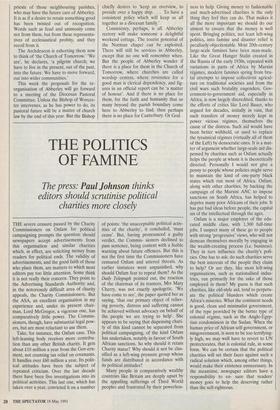THE POLITICS OF FAMINE
editors should scrutinise political charities more closely
THE severe censure passed by the Charity Commissioners on Oxfam for political campaigning prompts the question: should newspapers accept advertisements from this organisation and similar charities which, in effect, are soliciting money from readers for political ends. The validity of advertisements, and the good faith of those who place them, are matters to which most editors pay too little attention. Some think it is not really their concern. They point to the Advertising Standards Authority and, in the notoriously difficult area of charity appeals, the Charity Commissioners. But the ASA, an excellent organisation in my experience and, under its present chair- man, Lord McGregor, a vigorous one, has comparatively little power. The Commis- sioners, though, have substantial legal pow- ers, but are most reluctant to use them.
Take, for instance, the Oxfam case. This left-leaning body receives more contribu- tion than any other British charity. It gets about £10 million a year from the Govern- ment, not counting tax relief on covenants. It handles over £60 million a year. Its polit- ical attitudes have been the subject of repeated criticism. Over the last decade there have been five investigations into its political activities. This last one, which has taken over a year, convicted it on a number of points: 'the unacceptable political activ- ities of the charity', it concluded, `must cease'. But, having pronounced a guilty verdict, the Commis- sioners declined to pass sentence, being content with a feeble warning about future offences. But this is not the first time the Commissioners have censured Oxfam and uttered threats. As earlier instances went unpunished, why should Oxfam fear to repeat them? As the Daily Telegraph pointed out, the reaction of the chairman of its trustees, Mrs Mary Cherry, was not exactly apologetic. 'We have come to see', the paper quoted her as saying, 'that our primary object of reliev- ing poverty, distress and suffering cannot be achieved without advocacy on behalf of the people we are trying to help'. She appears to be saying that dispensing chari- ty of this kind cannot be separated from political campaigning, of the kind Oxfam has undertaken, notably in favour of South African sanctions. So why should it retain Charity status? Why should it not be clas- sified as a left-wing pressure group whose funds are distributed in accordance with its political attitudes?
Many people in comparatively wealthy countries like Britain are deeply upset by the appalling sufferings of Third World peoples and frustrated by their powerless-
ness to help. Giving money to fashionable and much-advertised charities is the only thing they feel they can do. That makes it all the more important we should do our utmost to ensure that the money is well spent. Bringing politics, not least left-wing politics, into famine and disaster relief is peculiarly objectionable. Most 20th-century large-scale famines have been man-made. Like the Great Hunger Stalin created in the Russia of the early 1930s, repeated with variations in parts of Africa by Marxist regimes, modern famines spring from bru- tal attempts to impose collectivist agricul- ture on traditional societies and from the civil wars such brutality engenders. Gov- ernment-to-government aid, especially in Africa, is now largely discredited, thanks to the efforts of critics like Lord Bauer, who argued for decades, initially in vain, that such transfers of money merely kept in power vicious regimes, themselves the cause of the distress. Such aid would have been better withheld, or used to replace the tyrannical regimes (virtually all of them of the Left) by democratic ones. It is a mat- ter of argument whether large-scale aid dis- pensed by charities such as Oxfam actually helps the people at whom it is theoretically directed. Personally I would not give a penny to people whose policies might serve to maintain the kind of one-party black states which run most of Africa. Oxfam, along with other charities, by backing the campaign of the Marxist ANC to impose sanctions on South Africa, has helped to deprive many poor Africans of their jobs. It has put bad ideas before people, the capital sin of the intellectual through the ages.
Oxfam is a major employer of the edu- cated middle class, with 1,300 full-time jobs. I suspect many of these go to people with strong 'progressive' views, who will not demean themselves morally by engaging in the wealth-creating process (i.e. business). They in turn influence the charity's poli- cies. One has to ask: do such charities serve the best interests of the people they claim to help? Or are they, like most left-wing organisations, such as nationalised indus- tries, run primarily for the sake of those employed in them? My guess is that such charities, like old-style aid, tend to perpetu- ate the political blunders which create Africa's miseries. What the continent needs is good, clean and minimalist government, of the type provided by the better type of colonial regime, such as the Anglo-Egyp- tian condominion in the Sudan. When the human price of African self-government, or misgovernment, is seen to be too terrifying- ly high, we may well have to revert to UN protectorates, that is colonial rule, in some form. We can be certain that the political charities will set their faces against such a radical solution which, among other things, would make their existence unnecessary. In the meantime, newspaper editors have a responsibility to en- sure that readers' money goes to help the deserving rather than the self-righteous.


























































 Previous page
Previous page